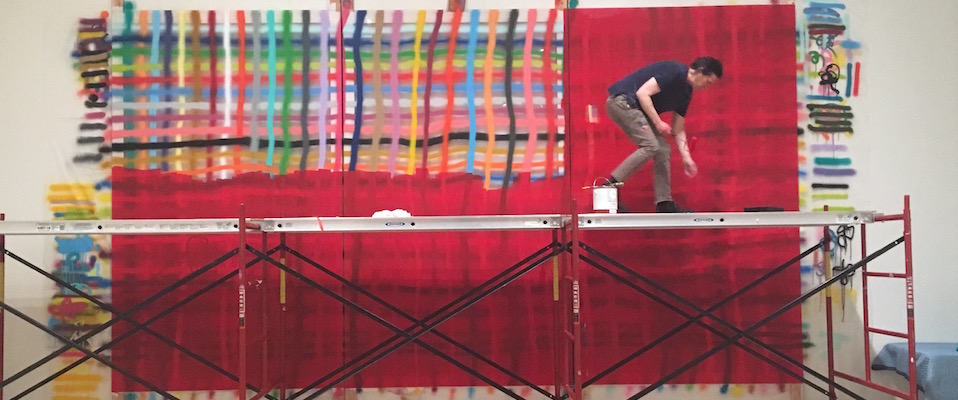Artist Alicia McCarthy, who got her MFA in art at UC Berkeley in 2007, had a big year in 2017. A part of the Bay Area art scene for 20 years, McCarthy is best known for being a key figure of the acclaimed Mission School, a group of artists associated with the San Francisco Art Institute who did work in San Francisco’s Mission District in the 1990s. Along with her spring show at the Berggruen Gallery, which exhibits major American post-war and emerging artists, McCarthy got a commission to do a piece at the San Francisco Airport, and she received San Francisco Museum of Art’s SECA (Society for the Encouragement of Contemporary Art) award, the most prestigious Bay Area award for living artists.
At her studio near Oakland’s Jack London Square, McCarthy seems happy for the recognition—but mostly, perhaps, because it lets her help out other artists. McCarthy recently moved to this studio, maybe five or six times bigger than her old one, and she’s glad not just to have more space for her own large pieces but because it means she can share with friends. Throughout the conversation, McCarthy mentions people who have helped her, including gallery owner Jack Handley.
“I feel very lucky, intensely very grateful to Jack Handley, who stuck with me for 11 years when I barely sold anything,” she said. “It’s great I have this space so I can work on more than one thing at a time, but also three of my friends can store their stuff here, and I feel happy that it’s a space that can be used.”
“Her work has this pattern and order and rigor…But there’s a casualness and looseness in that order.”
McCarthy constantly gives credit to artist friends who supported her, including Ruby Neri (with whom she has a show at Berkeley Art Museum), Chris Johanson, Barry McGee, and Margaret Kilgallen, also part of the Mission School. She also talks about the people who have helped her deal with the bureaucratic side of art. For McCarthy, who considers eight hours in the studio a short day, paperwork is challenging—she would rather just paint and draw.
In high school, McCarthy, the daughter of a mechanic and a nurse, took classes from a “kooky art lady,” who encouraged her. After graduation, she went to Humboldt State, where she met Virgil Shaw, the son of Cal art professor Richard Shaw. After Humboldt, McCarthy got her BFA from the San Francisco Art Institute, and now she teaches there and at the California College of the Arts. In her popular class, Low Budget High Art, students use found materials rather than purchasing them. McCarthy is known for using found materials herself, painting on wood, and using house and spray paint.
McCarthy was born in Oakland and lives there now. When she was looking to get an MFA for a more in-depth critique of her work and so she could teach, she knew she wanted to stay in the area. Shaw and people like professor emeritus Katherine Sherwood attracted her to Cal.
Erin O’Toole, who curated the SECA awards exhibition at SFMOMA with Jenny Gheith, calls McCarthy’s work “human and alluring.” People walking by the gallery see her large weave pattern painted on Plexiglass and are drawn into the room, O’Toole says.
“Her work has this pattern and order and rigor,” O’Toole said. “But there’s a casualness and looseness in that order.”
O’Toole says McCarthy has often included others in her shows. McCarthy’s friend Aaron Curry, known as ORFN, died right before she received the SECA award, and some of his pieces hang in the show. McCarthy also put into her paintings the initials of people involved with the work, including the exhibition crew O’Toole says, pointing to a small “eot” for her name.
“She really felt we were all part of it,” O’Toole said.
Other artists seem to appreciate McCarthy’s generosity and O’Toole says a lot are enthusiastic she received the SECA award.
“The number of people who expressed excitement she had won was remarkable,” O’Toole said. “It shows the love for her work and the affection for her as a person.”






















